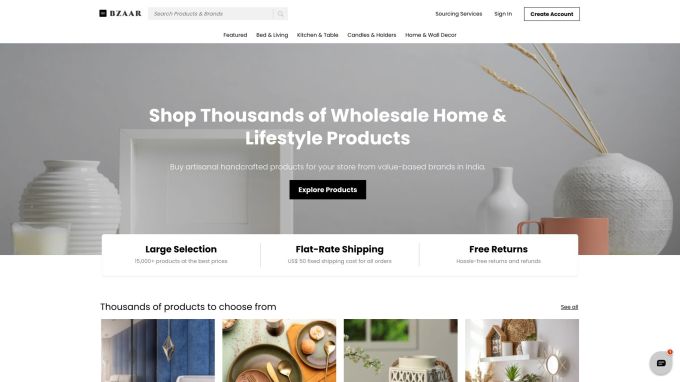Small businesses in the U.S. now have a new way to source home and lifestyle goods from new manufacturers. Bzaar, a business-to-business cross-border marketplace, is connecting retailers with over 50 export-ready manufacturers in India.
The U.S.-based company announced Monday that it raised $4 million in seed funding, led by Canaan Partners, and including angel investors Flipkart co-founder Binny Bansal, PhonePe founders Sameer Nigam and Rahul Chari, Addition founder Lee Fixel and Helion Ventures co-founder Ashish Gupta.
Nishant Verman and Prasanth Nair co-founded Bzaar in 2020 and consider their company to be like a “fair without borders,” Verman put it. Prior to founding Bzaar, Verman was at Bangalore-based Flipkart until it was acquired by Walmart in 2018. He then was at Canaan Partners in the U.S.
“We think the next 10 years of global trade will be different from the last 100 years,” he added. “That’s why we think this business needs to exist.”
Traditionally, small U.S. buyers did not have feet on the ground in manufacturing hubs, like China, to manage shipments of goods in the same way that large retailers did. Then Alibaba came along in the late 1990s and began acting as a gatekeeper for cross-border purchases, Verman said. U.S. goods imports from China totaled $451.7 billion in 2019, while U.S. goods imports from India in 2019 were $87.4 billion.
Bzaar screenshot. Image Credits: Bzaar
Small buyers could buy home and lifestyle goods, but it was typically through the same sellers, and there was not often a unique selection, nor were goods available handmade or using organic materials, he added.
With Bzaar, small buyers can purchase over 10,000 wholesale goods on its marketplace from other countries like India and Southeast Asia. The company guarantees products arrive within two weeks and manage all of the packaging logistics and buyer protection.
Verman and Nair launched the marketplace in April and had thousands users in three continents purchasing from the platform within six months. Meanwhile, products on Bzaar are up to 50% cheaper than domestic U.S. platforms, while SKU selection is growing doubling every month, Verman said.
The new funding will enable the company to invest in marketing to get in front of buyers and invest on its technology to advance its cataloging feature so that goods pass through customs seamlessly. Wanting to provide new features for its small business customers, Verman also intends to create a credit feature to enable buyers to pay in installments or up to 90 days later.
“We feel this is a once-in-a-lifetime shift in how global trade works,” he added. “You need the right team in place to do this because the problem is quite complex to take products from a small town in Vietnam to Nashville. With our infrastructure in place, the good news is there are already shops and buyers, and we are stitching them together to give buyers a seamless experience.”